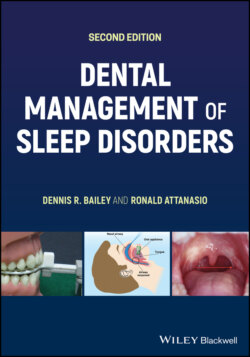Читать книгу Dental Management of Sleep Disorders - Ronald Attanasio - Страница 61
The Hyoid
ОглавлениеThis is an integral structure that supports the suprahyoid and infrahyoid muscles. The position of the hyoid relative to the mandibular plane is of importance as a reliable predictor of the risk for the SRBD when viewed on a cephalometric X‐ray. The more inferior the hyoid is from the mandibular plane the greater the risk for the SRBD (reviewed in Chapter 14). The muscles that relate to the hyoid no doubt control the position of the hyoid. This group of muscles is divided into two groups, the infrahyoids and the suprahyoids (Table 3.3).
Table 3.3 Muscles related to the hyoid.
| Muscle | Action |
|---|---|
| Infrahyoids | |
| Omohyoid | Depresses hyoid |
| Sternohyoid | Depresses hyoid |
| Sternothyroid | Depresses larynx |
| Thyrohyoid | Depresses hyoid |
| Suprahyoids | |
| Stylohyoid | Elevates hyoid |
| Retracts hyoid | |
| Mylohyoid | Elevates hyoid |
| Elevates floor of mouth | |
| Digastric | Elevates hyoid |
| Aids in depression and retraction of mandible | |
| Geniohyoid | Helps move hyoid and tongue anteriorly |
Table 3.4 Muscles involved with the oropharynx.
| Muscle | Action |
|---|---|
| Superior constrictor | Constricts upper portion of pharynx |
| Middle constrictor | Constricts middle portion of pharynx |
| Inferior constrictor | Constricts lower portion of pharynx |
| Palatopharyngeus | Elevates pharynx |
| Helps close nasopharynx | |
| Salpingopharyngeus | Elevates upper and later portions of pharynx |
| Stylopharyngeus | Elevates pharynx |
| Expands sides of pharynx (dilates pharynx) |
